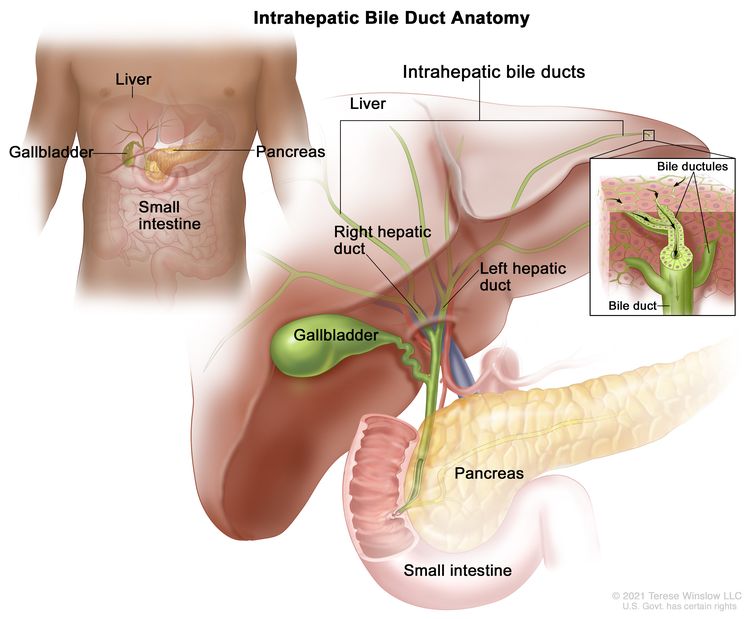Bile Duct Cancer is a rare form of cancer, in which cancer cells form in your bile ducts, a network of tubes that connect your liver, gallbladder, and small intestine. Bile Duct Cancer can present as Cholangiocarcinoma or Gallbladder Cancer.
Tap “Watch Now” for an easy-to-understand overview of Billiary Tract Unresectable Liver Cancer.
- Billiary Tract Unresectable Liver Cancer
Overview
Unresectable Bile Duct Cancer is a stage of the disease, where it affects nearby tissues and/or structures, shown here in green, which makes it difficult to remove through surgery, but without having spread to other organs.
What Tests Will I Need and Why?
Blood and Imaging tests are done to understand your general health, confirm your diagnosis and determine your cancer stage.
Tissue analysis is also typically done to identify the cancer cell type, which is critical to finding the best treatment option for you.
If your treatment team has not already performed tests to determine your cancer’s features, please ask your doctor when these tests will be performed.
Re-read this summary as needed and then tap, “Compare My Treatment Options Now“. Our unique Comparison Page will help you understand your FDA-approved treatment options including, who can help you pay for your treatment, where and how each is given and what side-effects you may experience.

Cancer Research U.K. CC BY-SA 4
Recommended Liver Cancer Videos

Liver Cancer In 4 Minutes
Hear from Doctor Sachin MODI

How Cancer Spreads
Metastatic = Advanced

Diagnosing Your Cancer
How Does a CT Scan Work?

Diagnosing Your Cancer
How Does a PET Scan Work?

Exercise! You Can Do It
Reducing Side Effects & More
Commonly Searched Questions
Unresectable Bile Duct Cancer Symptoms
These are some common symptoms you might experience if you have unresectable bile duct cancer;
- Yellowing of the eyes and skin (jaundice) and itchy skin
- Pale stool and dark urine
- Feeling weak constantly
- An abnormal swollen abdomen
- Nausea and vomiting
- Unintentional weight loss
- A lump on the right side below the rib cage
- Pain in the abdomen
Source: Cancer.gov
Unresectable Bile Duct Cancer Treatment
These are some common treatment options that are available for your unresectable bile duct cancer:
- A clinical trial of targeted therapy
- A clinical trial of immunotherapy
- Radiation therapy
- Palliative treatment with inserting a stent to direct bile outside the body
Now Click Here To Compare Your Latest Treatment Options.
Source: Cancer.gov
Unresectable Bile Duct Cancer Survival Rate
According to SEER data, unresectable bile duct cancer has a survival rate of 36.1%. This generally means that people with bile duct cancer are 36.1% as likely as people without cancer to live for 5 years after the diagnosis.
Source: Cancer.gov
Unresectable Bile Duct Cancer Recurrence Rate
The survival rate for unresectable bile duct cancer tends to be lower compared to resectable cases due to the tumor’s inability to be surgically removed. Patients with unresectable bile duct cancer often rely on treatments such as chemotherapy, radiation therapy, or targeted therapies, which can help manage the disease but do not generally offer the same survival prospects as surgery. While exact survival rates can vary based on individual factors and treatment responses, the overall prognosis for unresectable bile duct cancer is typically less favorable than for resectable cases. For precise survival statistics and information tailored to specific cases, consulting a healthcare provider is recommended.
Source: Cancer.gov
Unresectable Bile Duct Cancer Definition
Unresectable bile duct cancer refers to a type of bile duct cancer that cannot be surgically removed. This situation occurs when the cancer has spread to nearby structures, lymph nodes, or distant organs, making it impossible for surgeons to completely excise the tumor. Unresectable bile duct cancer may require alternative treatments such as chemotherapy, radiation therapy, or targeted therapy to manage the disease and alleviate symptoms.
Source: Cancer.gov
Unresectable Bile Duct Cancer Prevention
While specific strategies for preventing metastatic or locally advanced bile duct liver cancer are not explicitly defined, general approaches to reduce the risk of developing bile duct cancer include:
- Manage Chronic Conditions: Effectively treat chronic liver diseases and infections, such as hepatitis B and C, which increase the risk of bile duct cancer.
- Avoid Alcohol: Limit or avoid alcohol consumption to prevent liver damage and lower cancer risk.
Healthy Weight and Diet: Maintain a healthy weight and eat a balanced diet rich in fruits, vegetables, and whole grains, while avoiding excessive intake of red and processed meats. - Quit Smoking: Avoid tobacco use, as smoking is a risk factor for various cancers, including bile duct cancer.
- Protect Against Hepatitis Infections: Get vaccinated against hepatitis B and take precautions to avoid hepatitis C infection.
- Limit Exposure to Harmful Chemicals: Reduce exposure to chemicals known to increase cancer risk, including certain industrial chemicals and pesticides.
- Regular Medical Check-ups: For individuals with liver disease or other risk factors, regular medical follow-ups can aid in early detection and management.
Source: Cancer.gov






